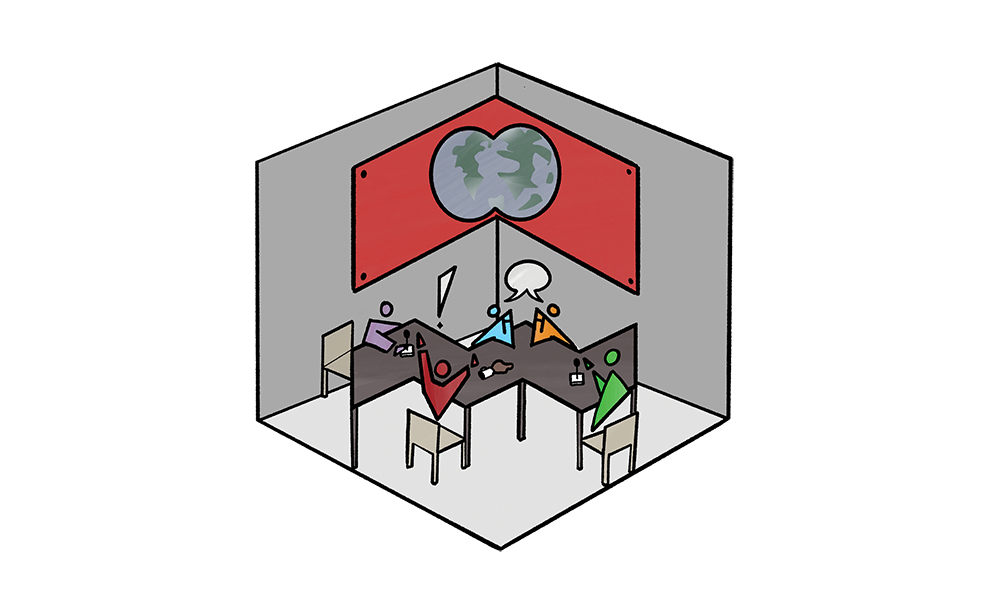This year’s overarching theme is “Utopia,” giving students opportunities to discuss plans for a better future in Montreal through policy changes
After two semesters of planning, teams of students from the School of Community and Public Affairs (SCPA) have begun presenting their panels on various social issues. The first panel took place on Feb. 1, and more will follow until the end of March.
The panels are a part of a class called “Social Debates and Issues in Public Affairs and Public Policy,” or SCPA 301. As described on Concordia’s website, the focus of the class is to help students “on developing both communication skills, through oral and written presentations, and organizational skills as each team must organize one public panel discussion on one of the selected issues.” Six panels will be presented, and the class typically consists of no more than 25 people. The goal of each panel is to bring awareness to a specific issue, like food insecurity, accessibility, or policing, and showcase the ideas of experts in their respective fields.
“Our panel is on food insecurity,” said student Romy Shoam. “The goal of our panel is to hear from experts on differing specific aspects of food insecurity in Montreal and in Canada. They’ll be talking about fixing this problem in an affordable and healthy way for all people. We want to hear about how we can reform our food system in Montreal, both in the short-term and long term.”
The panel will dive into specific problems that affect food security, ranging from accessibility and affordability of food as well as community cooperation to improve food insecurity. The panelists all have expertise within the Canadian food system in differing ways, ranging from the Montreal Food Policy Council to the Quebec Farmers’ Association. The panelists are Omar Elsharkawy, Erik Chevrier, Anne Marie Aubert, and John McCart.
Rose Chisholm is a student working on a panel that deals with ageism in urban life. “Our panel is called ‘Generation All: Reimagining Montreal.’ We want to have a big brainstorm about creating intergenerational environments. In Montreal, we’re really divided by age, especially in this epidemic of loneliness,” she said.
“In our capitalist society, if you’re not seen as part of that ‘productive’ age bracket, you’re disregarded,” she added. The panel will feature experts and researchers on creating age-friendly cities and bringing an end to the crisis of elder abuse. The students involved have partnered with RECAA (Respecting Elders Communities Against Abuse), the West-end Intergenerational Network, Concordia’s Dr. Meghan Joy, and engAGE Concordia to make this panel happen.
Ace Baldwin is working on a panel on policing in Montreal and its effects on certain communities. “Our panel began as a discussion on police reform, but our group wanted to take it a step further. Many people don’t understand what defunding the police really means or looks like, and I think it’s because it’s hard for people to imagine what defunding or abolishing police looks like — we’ve built our society around this. We know that policing has a negative impact on marginalized and racialized people,” they said.
The panel will focus on alternatives to the current systems in place regarding policing and its impact in Montreal, like defunding the SPVM and gearing those funds towards social workers and community organizations. Panelists will include experts and activists who have witnessed the horrors of police brutality, all of whom happen to be women of colour. The panelists are Marlihan Lopez, Amy Edward, Jessica Quijano, and El Jones.
This year-long course is now reaching its long-awaited climax as students present their panels. Each presentation will be around two hours long, with the last half hour reserved for questions. Due to ongoing pandemic restrictions, the panels will be taking place online. Information on how to sign up and watch the panels can be found on the SCPA Student Association’s Facebook page.
Visuals by James Fay




